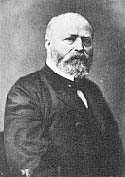 |
Dr. Berhardt von Gudden, late-19th Cent. Germany's leading psychiatrist.
Lead up to action
The Medical Report was signed by Dr Gudden on March 23rd, 1886, and the Conspirators waited for the right time to strike against Ludwig. Prince Luitpold was shown the Report, and was convinced by it that Ludwig was mentally deranged. But he demanded time to think the Report through, and the repercussions it would have on Bavaria. It is generally assumed that Prince Luitpold instigated the Conspiracy, and he was a kind of usurper of the Crown. Nothing could be further from the truth. He waited, and thought the matter over and over for almost 3 months, until finally giving in to the immense pressure placed on him by Prime Minister Lutz and the Cabinet.
In April, 1886, a copy of the Report was shown to the Prussian Chancellor, Bismarck, who at first was disturbed by it. But after some consideration, he called it "the rakings from the King's waste-paper basket and cupboards". He looked with scepticism at a document based on evidence extracted by Holnstein from lackeys through force and signed by a single Doctor who had never examined his patient. (Incidentally, Bismarck had noted in 1883 that Ludwig understood government better than his ministers, and commented after reading the Report that "the Ministers wish to sacrifice the King, otherwise they have no chance of saving themselves.") He suggested that the matter be brought before the Bavarian Diet and discussed in a session of Parliament, but this was the last thing Lutz wanted. Secrecy was vital.
Finally, through exasperation, Bismarck washed his hands of the whole affair, and wanting to get the matter dealt with before the Diet met, the final draft of the Report was signed by Dr Gudden as well as Dr Hubert von Grashey (Gudden's son-in-law), Dr Hagen and Dr Hubrich on the night of June 7-8, 1886. As a final precaution, the Ministry had fed the Bavarian newspapers stories about the King's mental health, and his fitness for governing. Public opinion had been influenced, and the Conspirators felt they had covered every eventuality.
Attempt at arrest
Finally, after months of planning, a Government Commission headed out from Munich to Neuschwanstein on the late afternoon of June 9th, 1886 to arrest Ludwig. The commission consisted of the following men -
- Baron von Crailsheim, Foreign Minister and Minister of the Household. He headed the commission.
- Count Törring, a councillor.
- Dr Rumpler, a councillor.
- Lieutenant-Colonel Washington.
- Count von Holnstein. Including this arrogant man was a stupid mistake on the part of the Conspirators, but fortunate for the King's cause.
- Dr Gudden. Leading psychiatrist.
- Dr Müller, Gudden's assistant.
- Several mental asylum wardens.
The Commission arrived at Hohenschwangau at around midnight, on a wet and drizzling night, where arrangements had been made to spend the night. They settled down to a seven-course dinner, during which 40 quarts of beer and 10 bottles of champagne were drunk. (Bavarians have always been large drinkers!). After dinner, Holnstein went out to find a carriage for the trip to Berg Castle, Ludwig's little castle on the shore of Lake Starnberg that had been converted to a mental asylum to receive him.
Holnstein found Ludwig's groom, Osterholzer, readying a carriage for the King's nocturnal ride. Holnstein ordered the carriage unharnessed, as another carriage and coachman would be taking the King tonight. Osterholzer refused, to which Holnstein boomed arrogantly, "The King gives no more orders now, only His Royal Highness Prince Luitpold."
Osterholzer was loyal to Ludwig and realised the danger the King was in. He quickly ran up the winding path to Neuschwanstein and was admitted to the King's room, where he poured out the story that he had been deposed. He and Weber, another loyal servant, implored Ludwig to escape while there was time, another coach could be ready in a few moments. Ludwig refused, thinking there was no real danger. He did, however, summon the local police and fire brigade to protect the castle gates, which were closed and bolted.
Meanwhile, down in the village, Osterholzer's absence had finally been noticed, and the Commission realised they're presence was known. Speed was more important than ever now. The others were roused from their sleep (it was now around 3:00 am) and they made their way up through the rain to the Castle gate. When the Commission reached the gates, they found the police force guarding it with bayonets drawn. For the moment, they were halted, and it was here that a now-famous episode happened.
Tragedy into Farce
Baroness Spera von Truchsess was an elderly Spanish-born Russian noble who was in love with Ludwig. She had used part of her vast fortune building a villa in Hohenschwangau so that she could be close to the King. She was also a frequent inmate at Dr Gudden's asylum. Being a noble, she knew all the Commission by name when she reached the castle to protect her beloved King, (she had an army of spies around Hohenschwangau so she would not miss any gossip) which she did by beating them with her parasol. Flailing her weapon, she managed to reach the interior of the Castle, and the King's room, and fell down before him, saying she would protect him. She named the Commission, and when Ludwig heard that it was headed by a trusted Minister, and included a one-time friend (Holnstein), he flew into a rage, and ordered their arrest at once.
During this time, news of the King's predicament had reached every peasant in the region, and the area before the gates were now filled with an army of men, women and children, threatening and harassing the now-embarrassed Commission. One thing they had not counted on was the loyally of the mountain peasants, who truly loved Ludwig.
Arrest of the Commission